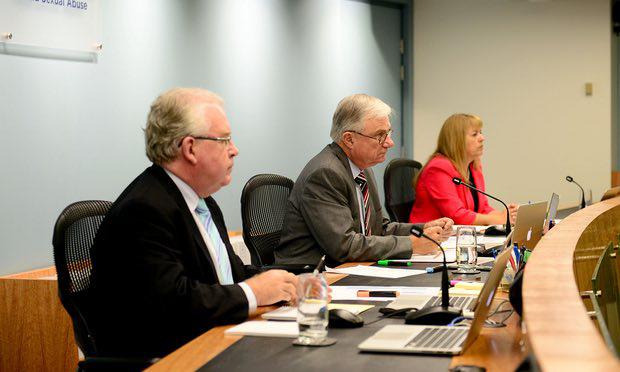|
Royal commission has led to more than 100 child abuse prosecutions, says head
By Melissa Davey
The head of the royal commission into child sexual abuse, Justice Peter McClellan, has referred 2,025 incidents of abuse to authorities since 2013, provoking 127 prosecutions to date. McClellan will share the figures at the National Council of Churches conference in Melbourne on Tuesday via a video address. He will tell the conference the volume of referrals was so great that there may be further prosecutions once they had been fully assessed by police. The commissioners have held more than 6,700 private sessions for survivors of institutional abuse. While some survivors gave evidence during the commission’s public hearings throughout the country, many more chose to give evidence to the six commissioners in private. To date, the commission has analysed the information from 6,302 of those private sessions, and McClellan will for the first time reveal the breakdown of institutions in which those survivors were abused. Thirty-two per cent of survivors who attended a private session reported abuse in a government institution, while 10% reported abuse in a secular institution. Religious institutions comprised 59% of reported abuse. Of all those who attended private session 37% said it occurred in a Catholic church institution. Nine per cent reported abuse in an Anglican institution; 4% in a Salvation Army institution; 3%t in an other Protestant institution; 2% in a Presbyterian and Reformed churches institution; 1.3% in a Uniting Church institution; 1% in a Jehovah’s Witness institution; 0.6% in a Baptist church; 0.5% in a Pentecostal churches’ institution; 0.4% in a Churches of Christ institution, 0.4% in a Seventh Day Adventist institution, and 0.3% in a Lutheran church institution. Of those who reported child sexual abuse in a religious institution, 70% were male. Their abuse began at an average age of 10. Almost 2,000 more private sessions will be held before December, when the royal commission’s final report and recommendations are due. The majority of the allegations received to date have emerged from faith-based institutions. “This inevitably raises the question ‘why’,” McClellan will tell the conference of ecclesiastical dignitaries and theological experts from around the country. “Why is it that in institutions which proclaim faith in God and embrace the highest ethical and moral principles so many children are abused? Why do some people who proclaim their faith and have accepted a life of religious endeavour breach their obligations to children? “Is there something in either the structure, culture, or personal qualities of members of the churches and other religious bodies, whether lay or ordained, that gives them such a prominent place amongst offenders? He will answer those questions by saying that while children would always be vulnerable to abusing adults, they were extra vulnerable when the adult was perceived by the child to be a manifestation of spiritual good or chosen by God. “The commissioners have heard many times from survivors who as children were told that if they tell anyone about the abuse they will be punished by God and may go to hell,” McClellan said. “The calculated exploitation of a child’s innocence is difficult to comprehend. The power afforded to the adult by the institution is corrupted and used to abuse the child.” McClellan is often asked by people whether he believes that much will change as a result of the commission’s work, and whether it has been worthwhile. “... I am now able to confidently give a positive answer,” he will say. “As we have continued with our work we can already see fundamental change occurring in the way institutions are managed with the introduction of many practices designed to protect the safety of children. “Although there may be some people in some institutions who resent the intrusion by the royal commission into their institution the overwhelming response is positive. “What we can be certain of is that any institution which does not acknowledge past wrongs and the need for change will lose the confidence of Australians. The community will not accept the legitimacy of any institution which does not give priority to the safety and wellbeing of the children which for which it has responsibility.”
|
.
Any original material on these pages is copyright © BishopAccountability.org 2004. Reproduce freely with attribution.
